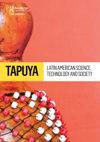The importance of hemispheric perspectives for the environmental humanities: reflections on bilingual digital environmental justice storytelling
IF 1.2
Q2 HISTORY & PHILOSOPHY OF SCIENCE
Tapuya: Latin American Science, Technology and Society
Pub Date : 2022-08-09
DOI:10.1080/25729861.2022.2098685
引用次数: 0
Abstract
ABSTRACT During the global pandemic and online teaching, we co-taught the keystone course for the new environmental humanities minor at the University of Pennsylvania. Beyond introducing students to transdisciplinary modes of communication and environmental humanities analytical frameworks, we focused the course around building a public engaged collaboration with community organizations and civil society initiatives in Colombia. The final project for the class resulted in a bilingual Digital Environmental Justice Storytelling platform that invites people to learn how different communities in Colombia engage with the arts and sciences in their activism and daily life to navigate environmental health uncertainties, defend territories, and transform urban and rural life conditions. In this article, we share our experience facilitating transdisciplinary international collaboration, bilingual translation, and multimodal methods in the building of the platform. We explain the pedagogical and methodological design of the project, placing emphasis on the flows of learning established between students and their Colombian community partners. The article includes the perspectives of different participants regarding their collaborative process, reflections about the importance of multilingual and hemispheric perspectives for the environmental humanities, and the impact of digital mediums as tools for environmental justice struggles and solidarity building.半球视角对环境人文学科的重要性:对双语数字环境正义叙事的反思
在全球大流行和在线教学期间,我们共同教授了宾夕法尼亚大学新环境人文辅修课程的关键课程。除了向学生介绍跨学科的交流模式和环境人文分析框架外,我们还将课程重点放在与哥伦比亚的社区组织和民间社会倡议建立公众参与的合作上。该课程的最终项目是一个双语数字环境正义故事平台,邀请人们了解哥伦比亚不同社区如何在他们的行动主义和日常生活中参与艺术和科学,以应对环境健康的不确定性,捍卫领土,并改变城市和农村的生活条件。在这篇文章中,我们分享了我们在平台建设中促进跨学科国际合作、双语翻译和多模式方法的经验。我们解释了项目的教学和方法设计,重点放在学生和哥伦比亚社区合作伙伴之间建立的学习流程上。本文包括不同参与者对合作过程的看法,反思多语言和半球视角对环境人文学科的重要性,以及数字媒体作为环境正义斗争和团结建设工具的影响。
本文章由计算机程序翻译,如有差异,请以英文原文为准。
求助全文
约1分钟内获得全文
求助全文
来源期刊

Tapuya: Latin American Science, Technology and Society
Social Sciences-Social Sciences (all)
CiteScore
1.60
自引率
0.00%
发文量
39
审稿时长
19 weeks
 求助内容:
求助内容: 应助结果提醒方式:
应助结果提醒方式:


